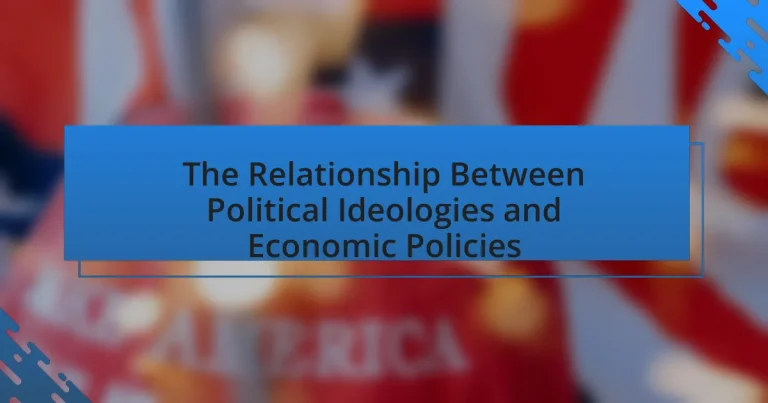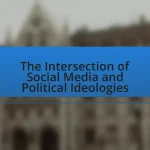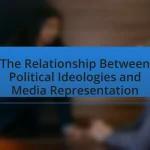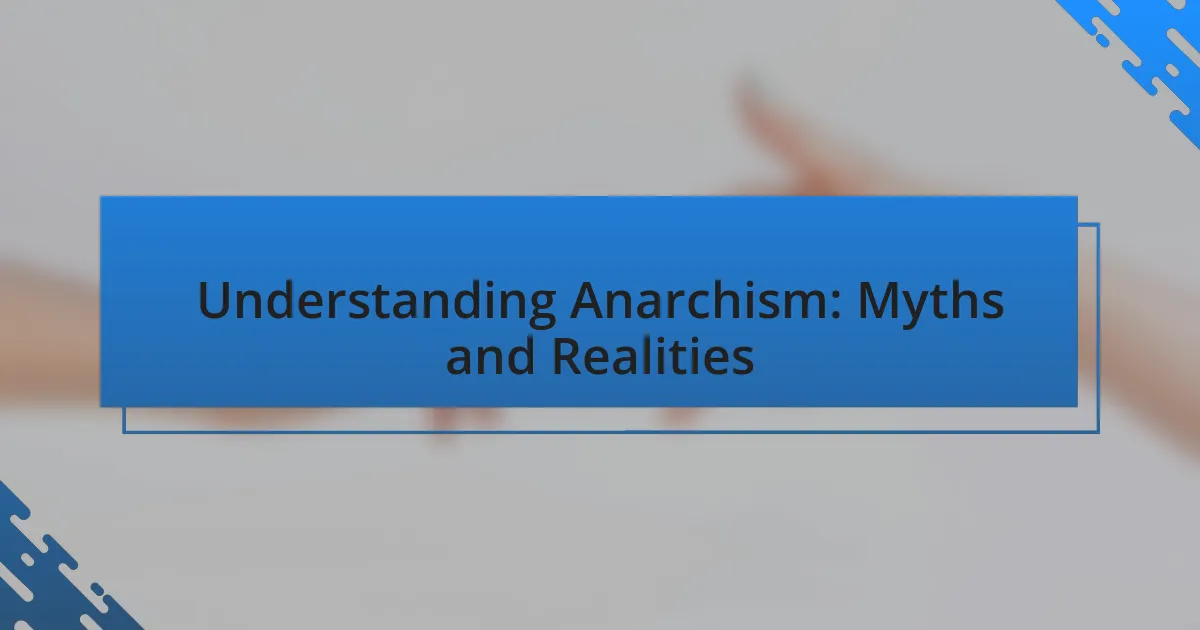The article examines the relationship between political ideologies and economic policies, highlighting how foundational beliefs shape governmental approaches to economic management. It discusses key ideologies such as liberalism, conservatism, and socialism, detailing their distinct impacts on taxation, regulation, and social welfare programs. Historical examples, including the New Deal and Reaganomics, illustrate how shifts in political power influence economic strategies and outcomes. The article emphasizes the importance of understanding this relationship for predicting economic stability and social welfare, as well as for informing decision-making in both governance and business contexts.
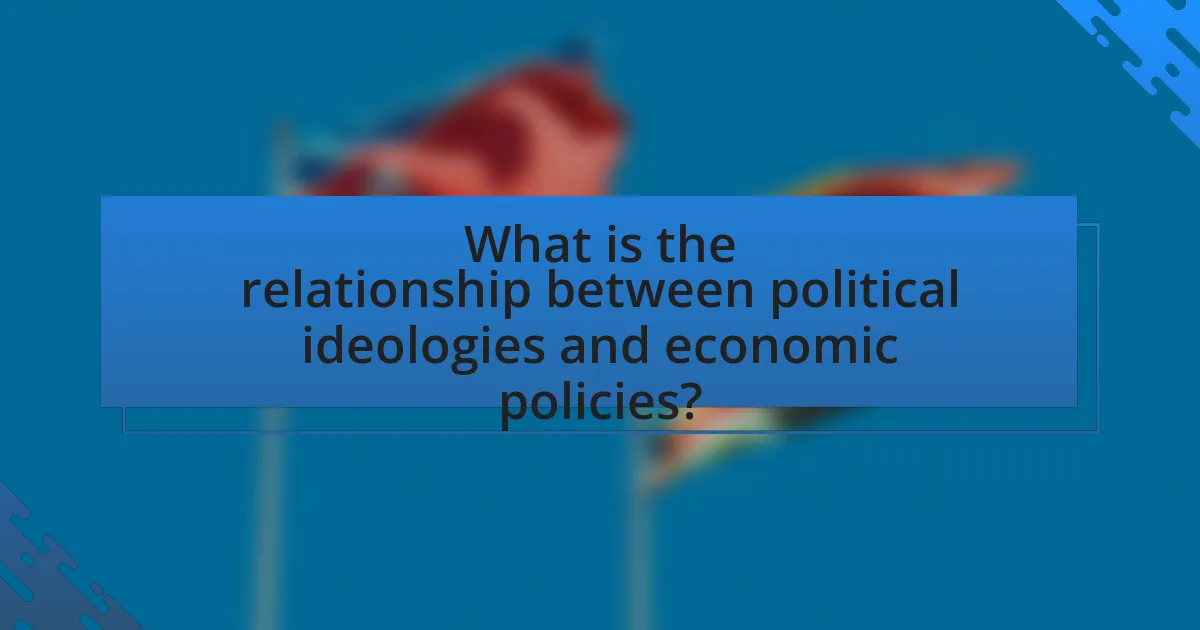
What is the relationship between political ideologies and economic policies?
Political ideologies significantly influence economic policies, as they provide the foundational beliefs and values that shape governmental approaches to economic management. For instance, liberal ideologies typically advocate for free markets, minimal government intervention, and individual entrepreneurship, leading to policies that promote deregulation and tax cuts. In contrast, socialist ideologies emphasize wealth redistribution and social welfare, resulting in policies that support higher taxation on the wealthy and increased public spending on social programs. Historical examples include the New Deal policies of the 1930s in the United States, which were influenced by progressive ideologies aimed at addressing economic inequality through government intervention. This relationship illustrates how the underlying principles of political ideologies directly inform the economic strategies implemented by governments.
How do political ideologies influence economic policies?
Political ideologies significantly influence economic policies by shaping the priorities and approaches that governments adopt in managing their economies. For instance, left-leaning ideologies, such as socialism, advocate for increased government intervention in the economy, promoting policies like wealth redistribution, social welfare programs, and public ownership of resources. In contrast, right-leaning ideologies, such as capitalism, emphasize free markets, limited government intervention, and individual entrepreneurship, leading to policies that favor deregulation and tax cuts. Historical examples include the New Deal policies of the 1930s in the United States, which were influenced by progressive ideologies aiming to address economic inequality, and the Reaganomics of the 1980s, which reflected conservative beliefs in reducing government size and promoting free-market principles. These ideological frameworks directly impact legislation, fiscal strategies, and regulatory environments, ultimately shaping the economic landscape of a nation.
What are the key political ideologies that shape economic policies?
Key political ideologies that shape economic policies include capitalism, socialism, and liberalism. Capitalism emphasizes private ownership and free markets, leading to policies that promote competition and entrepreneurship, as seen in the United States’ economic framework. Socialism advocates for collective ownership and government intervention in the economy, influencing policies in countries like Sweden, which implement extensive welfare programs. Liberalism focuses on individual rights and freedoms, often resulting in policies that support free trade and deregulation, as evidenced by the economic strategies of the European Union. Each ideology distinctly influences the formulation and implementation of economic policies based on its foundational principles.
How do different political ideologies prioritize economic goals?
Different political ideologies prioritize economic goals in distinct ways, reflecting their foundational beliefs about the role of government and the market. For instance, capitalism emphasizes free markets and minimal government intervention, prioritizing economic growth and individual entrepreneurship as key goals. In contrast, socialism prioritizes economic equality and social welfare, advocating for government intervention to redistribute wealth and provide public services. Additionally, communism seeks to eliminate class distinctions entirely, prioritizing collective ownership of resources and production to achieve a classless society. These ideological differences shape policies such as taxation, regulation, and social programs, influencing how economies are structured and managed.
Why is understanding this relationship important?
Understanding the relationship between political ideologies and economic policies is important because it directly influences governance and societal outcomes. Political ideologies shape the frameworks within which economic policies are developed, affecting decisions on taxation, regulation, and public spending. For instance, a study by the National Bureau of Economic Research found that countries with social democratic ideologies tend to implement more extensive welfare programs, leading to lower income inequality compared to those with neoliberal ideologies, which prioritize market freedom and minimal state intervention. This relationship is crucial for predicting how shifts in political power can impact economic stability and social welfare.
How does this relationship affect governance and policy-making?
The relationship between political ideologies and economic policies significantly influences governance and policy-making by shaping the priorities and decisions of leaders. For instance, a government led by a liberal ideology may prioritize social welfare programs and regulatory frameworks that promote equality, while a conservative government may focus on free-market policies and reducing government intervention. This ideological framework directly impacts legislative agendas, budget allocations, and the overall direction of economic strategies. Historical examples include the New Deal policies of the 1930s, which were driven by a progressive ideology aimed at economic recovery, contrasting with the supply-side economic policies of the 1980s that reflected conservative principles. Such ideological underpinnings guide the formulation and implementation of policies, ultimately affecting economic outcomes and societal welfare.
What implications does this relationship have for citizens and businesses?
The relationship between political ideologies and economic policies significantly impacts citizens and businesses by shaping regulatory environments and economic opportunities. For instance, a government with a liberal ideology may prioritize social welfare programs, which can enhance citizens’ quality of life but may also lead to higher taxes for businesses. Conversely, a conservative ideology often emphasizes free-market principles, potentially fostering a more favorable business climate but may result in reduced social services for citizens. Historical data shows that countries with social democratic policies, like those in Scandinavia, often experience lower income inequality and higher overall happiness among citizens, while businesses benefit from a well-educated workforce. Thus, the interplay between political ideologies and economic policies directly influences the economic landscape and social welfare, affecting both citizens and businesses.
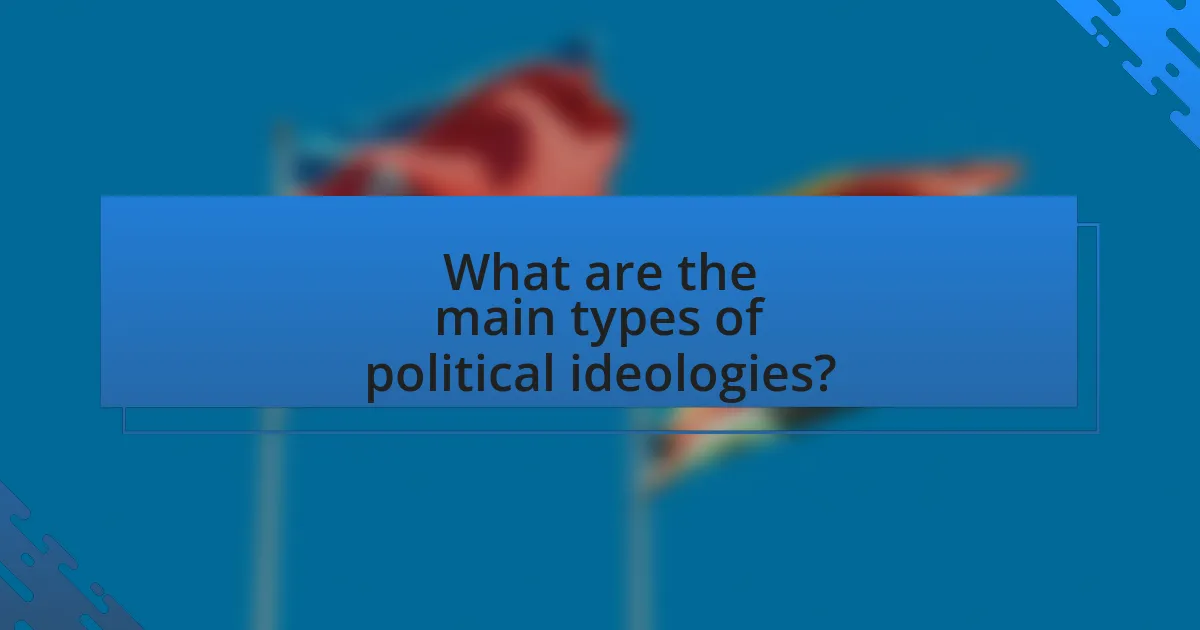
What are the main types of political ideologies?
The main types of political ideologies are liberalism, conservatism, socialism, and nationalism. Liberalism emphasizes individual rights and freedoms, advocating for democracy and free markets. Conservatism prioritizes tradition, social stability, and maintaining established institutions. Socialism focuses on social ownership and egalitarianism, aiming to reduce inequality through collective management of resources. Nationalism centers on the interests and culture of a specific nation, often promoting national sovereignty and identity. These ideologies shape economic policies by influencing government roles in markets, wealth distribution, and social welfare programs.
How do liberal ideologies approach economic policies?
Liberal ideologies approach economic policies by advocating for a mixed economy that balances free market principles with government intervention to promote social welfare. This approach emphasizes the importance of individual freedoms and equal opportunities while recognizing the need for regulations to address market failures and reduce inequality. For instance, liberal economic policies often support progressive taxation, social safety nets, and public services, which aim to enhance economic equity and provide essential support to disadvantaged groups. Historical examples include the New Deal in the United States during the 1930s, which implemented various government programs to stimulate the economy and provide relief to those affected by the Great Depression, illustrating the effectiveness of liberal economic policies in addressing social and economic challenges.
What economic principles are central to liberal ideologies?
Liberal ideologies centralize economic principles such as free markets, individual entrepreneurship, and limited government intervention. These principles advocate for the belief that economic freedom leads to innovation and prosperity, as evidenced by the success of market economies in promoting growth and improving living standards. Historical examples include the economic policies of the United States and the United Kingdom during the late 20th century, which emphasized deregulation and privatization, resulting in significant economic expansion.
How do liberal policies impact social welfare and economic growth?
Liberal policies positively impact social welfare and economic growth by promoting inclusive social programs and fostering a conducive environment for business innovation. These policies often prioritize healthcare, education, and social safety nets, which enhance the quality of life and productivity of the workforce. For instance, countries with liberal policies, such as the Nordic nations, exhibit high levels of social welfare spending, leading to lower poverty rates and higher overall life satisfaction. Additionally, liberal economic frameworks encourage entrepreneurship and investment through regulatory reforms and support for small businesses, contributing to sustained economic growth. Empirical evidence shows that nations with liberal policies tend to experience higher GDP growth rates, as seen in the World Bank’s data on economic performance across different political regimes.
What role do conservative ideologies play in shaping economic policies?
Conservative ideologies significantly influence economic policies by prioritizing free-market principles, limited government intervention, and fiscal responsibility. These ideologies advocate for lower taxes, deregulation, and reduced public spending, which are believed to stimulate economic growth and individual entrepreneurship. For instance, during the Reagan administration in the 1980s, tax cuts and deregulation were implemented, leading to a period of economic expansion and job creation, which conservatives cite as evidence of their economic approach’s effectiveness. Additionally, conservative policies often emphasize the importance of personal responsibility and the belief that a free market leads to more efficient resource allocation, further shaping economic frameworks in various countries.
What are the fundamental economic beliefs of conservative ideologies?
The fundamental economic beliefs of conservative ideologies emphasize free markets, limited government intervention, and individual entrepreneurship. Conservatives advocate for minimal regulation and taxation, believing that economic freedom fosters innovation and growth. Historical evidence, such as the economic policies of Ronald Reagan in the 1980s, demonstrates that tax cuts and deregulation can lead to increased economic activity and job creation. Additionally, conservative ideologies often prioritize fiscal responsibility, arguing that balanced budgets and reduced public spending are essential for long-term economic stability.
How do conservative policies affect taxation and government spending?
Conservative policies typically lead to lower taxation and reduced government spending. This approach is grounded in the belief that lower taxes stimulate economic growth by allowing individuals and businesses to retain more of their income, which can then be reinvested in the economy. For instance, during the Reagan administration in the 1980s, significant tax cuts were implemented, which proponents argue contributed to economic expansion and job creation. Additionally, conservatives often advocate for a reduction in government spending, emphasizing fiscal responsibility and the belief that a smaller government is more efficient. This is evidenced by policies aimed at cutting social programs and reducing public sector employment, which are intended to decrease the overall budget deficit.
How do socialist ideologies influence economic policies?
Socialist ideologies influence economic policies by advocating for collective ownership and redistribution of resources to promote social welfare and reduce inequality. These ideologies often lead to policies such as nationalization of key industries, progressive taxation, and extensive social safety nets. For instance, countries like Sweden and Norway implement high taxation rates to fund universal healthcare and education, reflecting socialist principles aimed at ensuring equitable access to essential services. Additionally, socialist policies can result in increased government intervention in the economy, as seen in the establishment of public enterprises that prioritize social goals over profit maximization.
What economic strategies are associated with socialist ideologies?
Economic strategies associated with socialist ideologies include state ownership of the means of production, wealth redistribution, and centralized economic planning. These strategies aim to reduce inequality and ensure that resources are allocated in a way that benefits the entire society rather than a select few. For instance, historical examples such as the nationalization of industries in the Soviet Union and the implementation of welfare programs in Scandinavian countries illustrate how socialist policies can manifest in practice. Additionally, the concept of progressive taxation is often employed to redistribute wealth more equitably among citizens, further supporting the socialist goal of economic fairness.
How do socialist policies address income inequality and public services?
Socialist policies address income inequality and public services by promoting wealth redistribution and ensuring universal access to essential services. These policies typically involve progressive taxation, where higher income earners pay a larger percentage of their income in taxes, which funds public services such as healthcare, education, and social welfare programs. For instance, countries like Sweden and Denmark implement high tax rates on the wealthy to finance comprehensive public services, resulting in lower income inequality as measured by the Gini coefficient, which in these nations is among the lowest globally. Additionally, socialist policies often include regulations that protect workers’ rights and promote fair wages, further contributing to a more equitable distribution of income.

What are the interactions between political ideologies and economic policies in practice?
Political ideologies significantly shape economic policies, influencing how governments approach issues like taxation, regulation, and welfare. For instance, liberal ideologies typically advocate for free markets and minimal government intervention, leading to policies that promote deregulation and lower taxes, as seen in the economic reforms of the Reagan administration in the 1980s. Conversely, socialist ideologies prioritize wealth redistribution and social welfare, resulting in policies that increase taxation on the wealthy and expand public services, exemplified by the Nordic model in countries like Sweden and Denmark. These interactions demonstrate that the underlying beliefs of political ideologies directly inform the economic strategies implemented by governments, affecting economic outcomes and societal structures.
How do political ideologies manifest in real-world economic policies?
Political ideologies manifest in real-world economic policies through the implementation of specific fiscal and regulatory frameworks that reflect their core principles. For instance, liberal ideologies often advocate for free markets, minimal government intervention, and policies that promote individual entrepreneurship, as seen in the deregulation efforts of the Reagan administration in the 1980s, which aimed to stimulate economic growth through tax cuts and reduced government oversight. Conversely, socialist ideologies emphasize wealth redistribution and social welfare programs, exemplified by the Nordic model, where high taxation funds extensive public services and social safety nets. These ideological underpinnings directly influence policy decisions, shaping the economic landscape and impacting societal outcomes.
What are examples of countries where political ideologies have shaped economic policies?
Countries where political ideologies have shaped economic policies include China, the United States, and Venezuela. In China, the Communist Party’s ideology has led to a state-controlled economy with significant government intervention, resulting in rapid industrialization and economic growth since the late 20th century. The United States, influenced by capitalist ideologies, has implemented free-market policies that promote entrepreneurship and innovation, contributing to its status as a global economic leader. In Venezuela, the socialist policies under Hugo Chávez resulted in nationalization of key industries and extensive social programs, which have led to economic challenges and hyperinflation. These examples illustrate how distinct political ideologies directly influence the economic frameworks and policies of nations.
How do political parties leverage ideologies to influence economic decisions?
Political parties leverage ideologies to influence economic decisions by aligning their policy proposals with the core beliefs and values of their constituents. For instance, a party that advocates for free-market capitalism may promote tax cuts and deregulation, arguing that these measures stimulate economic growth and innovation. Conversely, a party rooted in social democracy may support increased government spending on social programs, asserting that such investments reduce inequality and enhance overall economic stability. Historical examples include the New Deal policies of the Democratic Party in the 1930s, which were driven by a belief in government intervention to address economic crises, leading to significant changes in labor laws and social welfare systems. This ideological alignment not only shapes legislative agendas but also mobilizes voter support, as constituents are more likely to back parties that reflect their economic beliefs.
What challenges arise from the relationship between political ideologies and economic policies?
The relationship between political ideologies and economic policies presents challenges such as ideological polarization, policy inconsistency, and social inequality. Ideological polarization occurs when differing political beliefs lead to extreme divisions, making bipartisan cooperation difficult, as seen in the United States where partisan divides hinder comprehensive economic reforms. Policy inconsistency arises when shifts in political power result in abrupt changes to economic policies, creating uncertainty for businesses and investors; for example, changes in tax policy with each administration can disrupt long-term economic planning. Additionally, certain economic policies may exacerbate social inequality, as seen in neoliberal approaches that prioritize market efficiency over social welfare, often leaving marginalized groups without adequate support. These challenges illustrate the complex interplay between political ideologies and economic policies, affecting governance and societal outcomes.
How do ideological conflicts impact economic stability?
Ideological conflicts significantly undermine economic stability by creating uncertainty and disrupting market confidence. For instance, when political factions clash over economic policies, businesses may hesitate to invest, leading to reduced economic growth. Historical examples include the economic turmoil in Venezuela, where ideological disputes over socialism versus capitalism resulted in hyperinflation and a collapse of the economy. Additionally, research from the International Monetary Fund indicates that countries experiencing high levels of political polarization often face increased volatility in their financial markets, further illustrating the detrimental effects of ideological conflicts on economic stability.
What are the consequences of policy shifts driven by changing political ideologies?
Policy shifts driven by changing political ideologies can lead to significant economic and social consequences. For instance, a shift from a conservative to a progressive ideology may result in increased government spending on social programs, which can stimulate economic growth but also lead to higher national debt. Conversely, a shift towards conservatism may prioritize tax cuts and deregulation, potentially fostering a more business-friendly environment but risking increased income inequality. Historical examples include the New Deal policies of the 1930s, which expanded the role of government in the economy, and the Reaganomics of the 1980s, which emphasized tax reduction and free-market principles. These shifts illustrate how political ideologies directly influence economic policies and their outcomes.

What practical insights can be drawn from the relationship between political ideologies and economic policies?
The relationship between political ideologies and economic policies reveals that different ideologies significantly influence the design and implementation of economic strategies. For instance, left-leaning ideologies typically advocate for increased government intervention in the economy, promoting policies such as wealth redistribution and social welfare programs, as seen in Scandinavian countries where high taxes fund extensive social services. Conversely, right-leaning ideologies often emphasize free-market principles, advocating for lower taxes and minimal government intervention, which is evident in the economic policies of the United States during the Reagan administration, where tax cuts and deregulation were prioritized. These ideological frameworks shape not only the economic landscape but also the societal outcomes, such as income inequality and access to public services, demonstrating that the alignment of political beliefs with economic policies has tangible effects on a nation’s economic health and social equity.
How can individuals and businesses navigate this relationship effectively?
Individuals and businesses can navigate the relationship between political ideologies and economic policies effectively by staying informed about the political landscape and its impact on economic regulations. Understanding the specific policies that arise from different political ideologies allows individuals and businesses to anticipate changes that may affect their operations or personal finances. For instance, businesses can analyze how a shift towards a more progressive ideology may lead to increased regulations or higher taxes, while a conservative approach might favor deregulation and tax cuts. Engaging in advocacy and participating in the political process, such as voting and lobbying, can also help shape policies that align with their interests. Research indicates that businesses that actively engage with policymakers can better influence economic outcomes, as seen in studies by the Harvard Business Review, which highlight the importance of corporate political activity in shaping favorable economic conditions.
What strategies can be employed to adapt to changing economic policies influenced by political ideologies?
To adapt to changing economic policies influenced by political ideologies, organizations can implement flexible strategic planning and continuous monitoring of policy developments. Flexible strategic planning allows organizations to adjust their business models and operational strategies in response to new regulations or economic shifts, ensuring resilience. Continuous monitoring of policy developments, such as tracking legislative changes and political trends, enables organizations to anticipate potential impacts on their operations and make informed decisions. For instance, businesses that actively engage in lobbying or advocacy can influence policy outcomes, aligning their interests with favorable economic conditions. Historical examples, such as the adaptation of companies during the New Deal era in the 1930s, demonstrate that proactive engagement with shifting political landscapes can lead to successful navigation of economic changes.
How can understanding this relationship inform better decision-making in economic matters?
Understanding the relationship between political ideologies and economic policies can significantly enhance decision-making in economic matters by providing insights into how different ideologies shape policy outcomes. For instance, research indicates that liberal ideologies often advocate for increased government intervention in the economy, which can lead to policies aimed at reducing inequality and promoting social welfare. Conversely, conservative ideologies typically emphasize free-market principles, which can foster economic growth through deregulation and lower taxes. By analyzing these ideological frameworks, policymakers can better anticipate the economic implications of their decisions, leading to more informed and effective policy-making. Historical examples, such as the New Deal under Franklin D. Roosevelt, illustrate how a shift in political ideology can result in substantial changes in economic policy, ultimately affecting employment rates and economic recovery.
